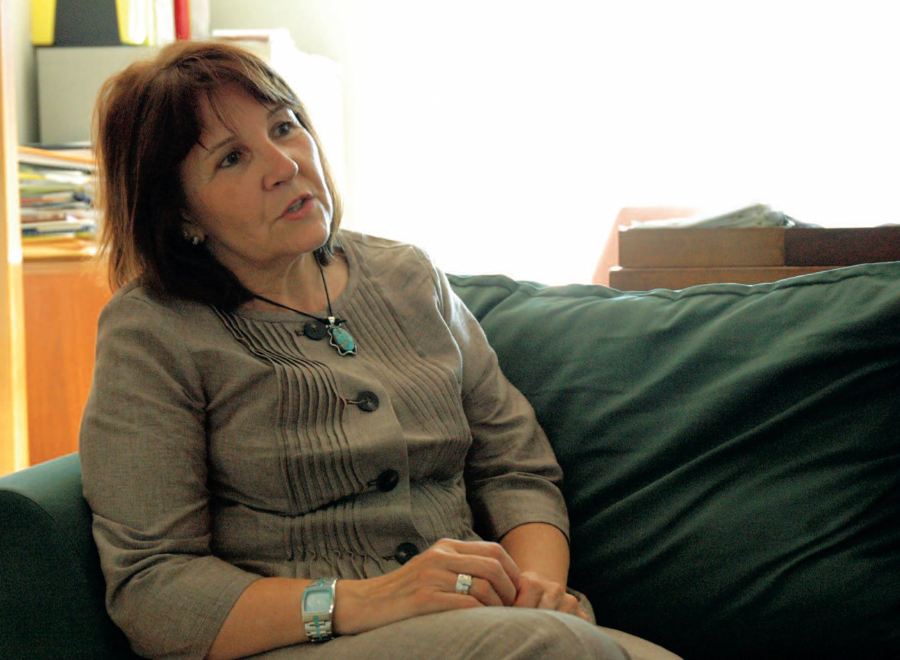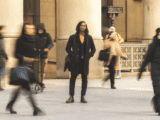Marie Wilson, a member of Yellowknife United, recently became one of three commissioners appointed to examine the legacy of the Indian residential school system. She talks to Mike Milne about the monumental task ahead for the national Truth and Reconciliation Commission.
MIKE MILNE: You grew up in Sarnia, Ont., and went to university in London, Ont. What led you to Canada’s North in the mid-1970s?
MARIE WILSON: While working on a master’s degree of journalism in London, I also worked at the Native people’s resource centre. It was a time when Indigenous people in Canada were just finding their voices and expressing themselves. Some of the most compelling presentations were from northern Native leaders. Those were the stories I wanted to be writing.
I started off in Regina at the Leader-Post, then went to CBC Radio in Yellowknife, then to Quebec City as a national reporter. When CBC in Quebec went on strike for seven months, I packed up and headed north with my husband, whom I had met in London, Ont., but who is from Fort Good Hope in the Northwest Territories. So instead of being a national radio reporter in Quebec City, I was the community radio trainer in Fort Good Hope.
MM: How will three decades as a northerner help you on the Truth and Reconciliation Commission (TRC)?
MW: One of the things that is an enormous value in the North is that we do not have a system of First Nation reserves. So we have communities that are predominantly Aboriginal in population but not closed in any way. Indigenous and non-Indigenous people live and work together and always have. We also have a unique system of government; we don’t have party politics. You can have a whole government of ministers who don’t agree, so they have to work really hard at finding common ground. The rest of Canada has a lot to learn about how things might be done differently.
MM: About a year has been lost as the original three TRC commissioners resigned due to personality conflicts and bickering. Can the new TRC commissioners make up for that time?
MW: We cannot do anything about what has happened in the past. What we can bring to it is a stake in the story as individuals, all three of us. One of us is a survivor, one of us is the child of a survivor and I am the spouse of a survivor. So we are all directly and personally implicated in this story. If we somehow allow it to be just survivors talking to themselves, we will have missed a huge opportunity.
This is Canada’s story. It happened because of a policy framework that denied parents access to their children, that made it illegal for them to take their children out of those schools. We as Canadians don’t get to cherry-pick our own history. It doesn’t mean we have to like all of it, but we have to learn from those parts of it that we don’t like, that do not feel honourable to us. And we have to do all that we can think of to make sure that it will never happen again.
Our challenge as commissioners is to help all of Canada understand that we may be able to bring new action and new understanding to the realities in our country and possibly some new thoughts about how we can work together. Our job is a five-year project, but this work is a going-forward legacy.
MM: Were you always connected with the United Church or did that begin in Yellowknife?
MW: I grew up in the United Church and took a semi-divorce from it as a young adult. But perhaps the way back, for many people, is to live through enough crises that rattle you to the level of spirit that you realize you just need to go somewhere that feels safe. Interestingly, if I were to describe it today — and I wouldn’t have been able to at the time — I’d say the residential school legacy brought me back to the United Church. I was experiencing some crises on the home front that left me isolated and alone. I was far away from my birth family, and this issue of residential schools permeates my entire extended family in the North. In a way, we were all on a sinking ship together but none of it was named at that point, and I had no idea what I was dealing with. I just knew that I was really struggling.
The familiarity of the hymns at Yellowknife United took me back to a place of nostalgic safety and made me feel tied to my family in a spiritual way. What kept me there is one amazing person, [former moderator Very Rev.] Peter Short, who was minister at that time. He saved my life to the extent that he saved my spirit and gave me a new foundation for putting one foot in front of the other. And it led to a whole lot of other things that eventually opened the door to my husband being able to name the invisible monster we were living with. It didn’t make everything easy, but it did give us a framework for understanding what was going on.
MM: Former colleagues at CBC North, where you worked for close to two decades, have called you “tough” and “strong.” How will those qualities serve you as you listen to the stories of residential school survivors?
MW: I fully expect to be both hardened and softened by this experience. I’m not going to be any use to anyone if I’m sitting there blubbering through a terrible story. On the other hand, I don’t ever want to lose my heart for the humanity behind that story.
MM: Stephen Kakfwi, your husband and the father of your three children, is a well-known Indigenous leader, a former territorial premier, a singer-songwriter and a residential school survivor. Has your life together given you any special insights into the effects of residential schools?
MW: Part of the story of residential schools and their legacy is that the things that happened there affect the people who went through them and the whole next generation. We’ve lived through our own versions of serious dysfunction, especially when it is not named and is a terrible, dirty secret.
There is enormous liberation once something is actually said out loud and shared. For survivors who have the courage to share their stories — and it takes enormous courage — there is the potential that new understandings and new support can bring enormous healing.
MM: What is your hope for the Truth and Reconciliation Commission?
MW: My hope is that all survivors in the country will get to tell their story or will know there will be an opportunity to tell their story if it has not happened within the five-year window. And that all the rest of Canada will have found, in their hearts and through our efforts, a way to hear those stories and to be touched and influenced by them, and moved to new action together.
***
This story first appeared in The United Church Observer’s November 2009 issue with the title “‘I fully expect to be both hardened and softened by this experience.’”















